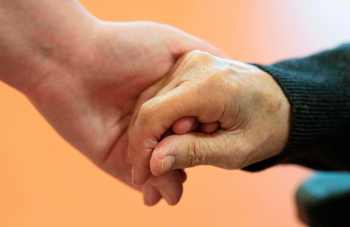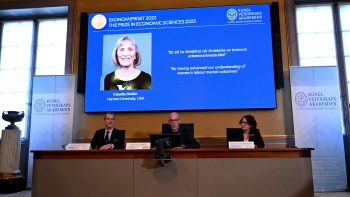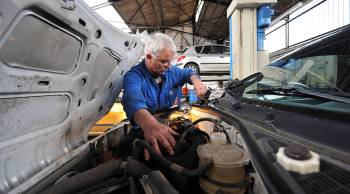Kai Ryssdal: Don’t know about you, but all the talk of bank earnings from Bob Moon up at the top of the broadcast today brought me right back to the financial crisis. And specifically how — during the post mortem after the melt-down — so much of the talk was about Wall Street’s failure to plan, failure to anticipate the remote chance that once in a while things go really wrong and when they do, it’s really, really bad.
That rude awakening has changed the way we think about all kinds of economic — and human — disasters. And it turns out how severe the impact is has a lot to do with how long the disaster — and our response to it — lasts.
Marketplace’s David Brancaccio has more from New York. Hey David.
David Brancaccio: Hey there.
Ryssdal: So this is the proverbial black swan, yes?
Brancaccio: Yeah, you bet. Realization that just because is unlikely doesn’t mean it won’t happen. But this time, it’s not just about managing financial risk. Chatham House, the international thinktank in London, looked at a range of bad things that can happen. They call them high-impact, low-probability events. And among the findings: when a catastrophe strikes a major hub in our interconnected world here, we got one week before severe disruption sets in.
Ryssdal: We have a week? How do they know?
Brancaccio: Well they looked at a case study. They looked at the case of the eruption in Iceland of Eyjafjallaj…I don’t know Eyjafjallajokull.
Ryssdal: No really, are you going to try that?
Brancaccio: Eyja… whatever it is. The ash cloud for the volcano.
Ryssdal: I could show off and do it right here, but I won’t. But anyway…
Brancaccio: I’d bet you could my friend. Researchers found that had ash kept airports shut just a couple more days, it would have taken at least a month for companies to recover. Here’s Bernice Lee, a research director for Chatham House.
Bernice Lee: What we found was that a lot of companies — even if they did prepared for them, they did not actually prepare for a prolonged disruption. So if the crisis went on, many of them would really be stuck and wondering how to respond.
Brancaccio: Her report urges industries to think long and hard about that popular practice — we’re always talking about it — “just in time” delivery of components that can leave a company dangling even after a far off catastrophe. But also, they say, do stress tests.
Ryssdal: Like we do with the banks, right?
Brancaccio: Yeah, and build on that idea. The busiest hub for airborne cargo in the U.S. is the airport in Memphis, Tenn. The…
Ryssdal: Now wait. You got to explain why, right? It’s because…
Brancaccio: FedEx is there — and UPS to a large extent– nicely in the middle of the country. But they’re near a big earthquake fault — a dangerous one. It turns out, that airport tested for quakes that include, a very unlikely, very big one. John Greaud is V.P. of operations for the airport.
John Greaud: We actually have a project, which should be complete in the next few months here, that should protect us up to — what they call — a 1 in 2,475 chance of occurring. It’s vital that we keep the airfield open. That’s what we bring to the table.
Brancaccio: Yeah, they turned out a questionable section of the runway — that ferries the FedEx jets across the road — is getting fixed now, was vulnerable.
Ryssdal: So, that’s kind of infrastructure and I get that. There’s lots of things in this country that we need to spend money on. Is getting ready for a black swan one of them?
Brancaccio: Yeah, it’s tough when government budgets are this tight. I talked to Daniel Kaniewski who does homeland security planning. He says people talking about planning for remote possibilities like this have a tough pitch.
Daniel Kaniewski: They’d probably be thrown out of the room and told they were crazy to make an investment in some of those areas when we much more pressing threats that face us every day, you know. With al-Qaeda attacks or natural disasters that occur, whether it be a hurricane in Florida or a wildfire in California. Those are clear and present dangers.
Ryssdal: So where does that leave us David? I mean, what are we supposed to do now?
Brancaccio: Well, Kaniewski wants policymakers to have an “open and honest dialogue” with the public so we can decide limited disaster-planning money.
Ryssdal: David Brancaccio and our series Economy 4.0. David, thanks a lot.
Brancaccio: You bet.
There’s a lot happening in the world. Through it all, Marketplace is here for you.
You rely on Marketplace to break down the world’s events and tell you how it affects you in a fact-based, approachable way. We rely on your financial support to keep making that possible.
Your donation today powers the independent journalism that you rely on. For just $5/month, you can help sustain Marketplace so we can keep reporting on the things that matter to you.


















